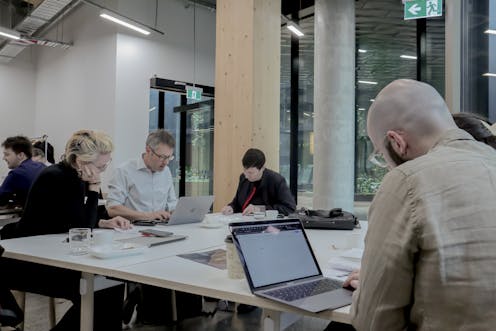Why collaboration is key to how we work at The Conversation
- Written by Misha Ketchell, Editor, The Conversation

One of the most rewarding things about working at The Conversation is being part of a project that brings people together when so often the focus in the media is on drama and division.
According to the Scanlon Foundation[1], social cohesion in Australia is in decline and recently hit an all-time low. This is hardly surprising when social media algorithms reward content that plays up conflict. Nothing sums up the mood of the times quite like the rise of the “Instagram influencer”, someone whose fame and wealth are celebrated regardless of any contribution to the greater good.
If you’ve any doubt about how much has changed in a fairly short space of time, consider John F. Kennedy’s famous line: “Ask not what your country can do for you – ask what you can do for your country.” In 2024, could anything sound more out of tune? Author Anne Manne brilliantly described the contemporary embrace of narcissism several years ago in a book called “The Life of I”[2].
At The Conversation, we have always known that it’s not about us. In 2011, we launched with a mission to unlock the knowledge within Australian universities and research institutions and make it available to the public.
We do this in Australia and New Zealand through collaboration, by pairing professional journalists with academics to work together on articles that inform the public. But the collaboration doesn’t end there, we also work with teachers, librarians, universities and colleagues at other media outlets to ensure our work is widely shared.
We give away our work for free to serve our community and we know it is making a difference.
When the Cumberland Council in New South Wales recently banned books on same-sex relationships, I was with two colleagues from The Conversation at a conference of librarians in Adelaide. The conference attendees told us they were mortified at the pain the ban caused to many in the community they served. They felt they were unfairly being placed in the middle of a confected culture-war controversy.
Meanwhile, back at the office, our editorial team was working carefully to find an expert on children’s literature. Shortly afterwards, Sarah Mokrzycki at Victoria University published a timely article[3] explaining how books that represent the real lives of children and their families can create inclusivity rather than division.
The council ban has now been reversed, but the self-serving partisan forces that created it continue to grow in strength. That’s why, with your help, we are committed to continuing to inject sober and evidence-based journalism into the public discourse every day.
Your generous donations pay about 40% of our annual running costs and at the end of each financial year, we ask you, our readers, to help if you can[4]. Your support powers our newsroom, keeps us publishing, and makes an impact not just on your life but on your whole community.
Every year we’ve been doing this, we’ve been blown away by your generosity. You have shown us, time and time again, that you care enough to do something completely selfless.
Please give if you can this year[5] and help us share information that contributes to the greater good and helps to keep the forces that would divide us at bay.
References
- ^ Scanlon Foundation (www.scanlonfoundation.org.au)
- ^ “The Life of I” (www.booktopia.com.au)
- ^ a timely article (theconversation.com)
- ^ help if you can (donate.theconversation.com)
- ^ give if you can this year (donate.theconversation.com)
Read more https://theconversation.com/why-collaboration-is-key-to-how-we-work-at-the-conversation-231177
















